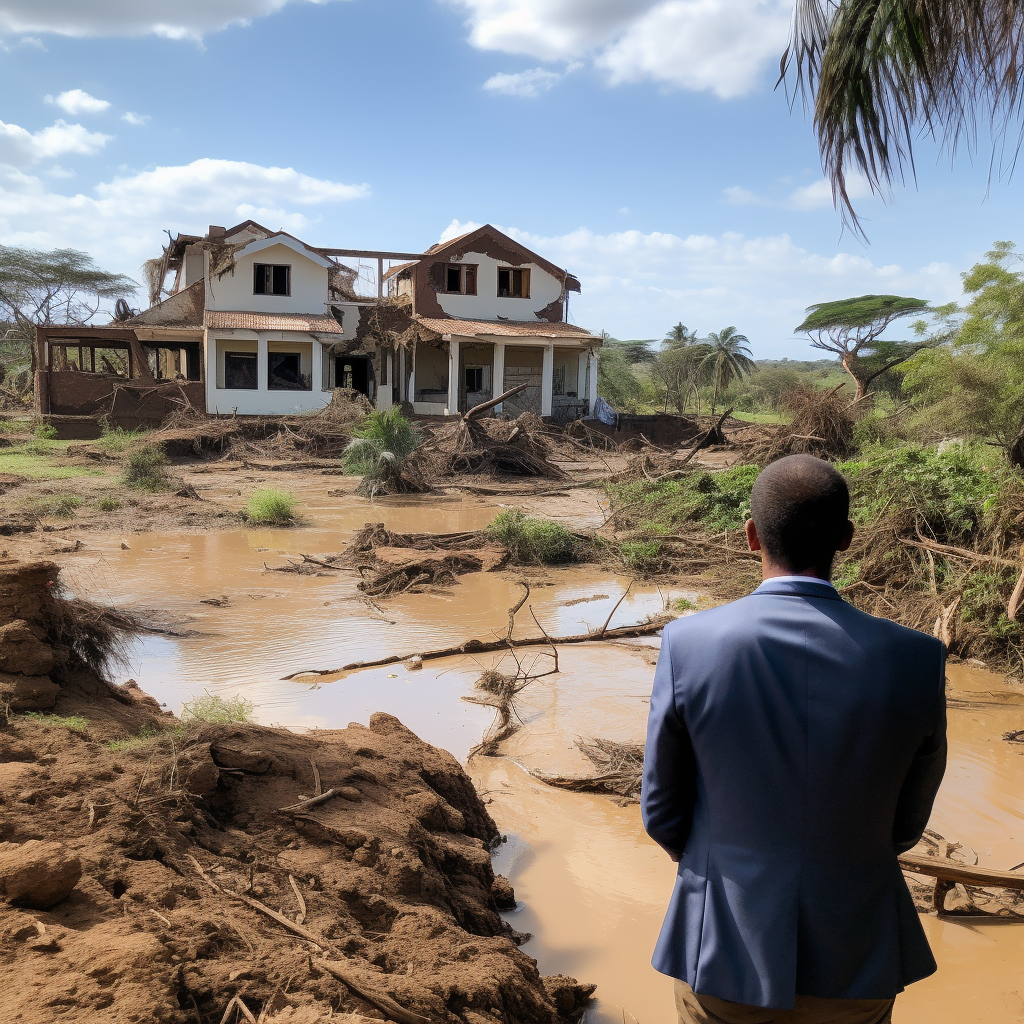Most homeowners in Kenya look at insurance as a luxury and not a necessity. However, this is not the case.
We all know somebody who’s home has been affected by fire, flood and burglary. Home insurance provides the single best way to protect your home from any unforeseen incidents.
What’s more, insurance isn’t always your choice. Most mortgage lenders have home insurance as a prerequisite. They want to know their investment is protected.
Looking to secure your own home or rental unit today? Buy home insurance in just 5 minutes!
Table of Contents
What Home Insurance Covers
Although customizable to your needs, most insurance providers have a home policy with elements that cover:
Dwelling Coverage

This covers the cost of repairing damage to the structure of your property. It includes the building itself plus attached structures like your garage, the front and back porch.
Most policies stipulate that repairs are to be made using the same quality and type of materials as what was lost.
And in the event of a total loss, the cover takes care of complete reconstruction to replace the building if a covered hazard causes the damage.
The damages covered under a dwelling cover differ from one provider to another but are commonly:
- Fire and explosions
- Theft, attempted burglary and vandalism
- Burst pipes
- Fallen trees, aerial or satellite dishes
- Vehicle or aircraft collisions
- Falling objects
The limit on compensation in the case of a total reconstruction is based on the cost of rebuilding your home and not necessarily its market value.
This will generally cover labour costs, materials, any professional fees and clearing costs. Your insurer will calculate this cost based on the information you give when taking the cover.
Contents Coverage
This protects the personal belongings in your home against theft or damage. These include items like gadgets, furniture and kitchen equipment.
With contents insurance, your insurer replaces your old items with new ones. For example, if your television is stolen, you get compensated with an equal one.
If you have other valuable items, e.g. an expensive piece of art, you can also have this included in your cover for some extra shillings.
However, for such items, your insurer may put a limit on how much to compensate you due to their worth. This could be between 50% – 70% of the initial purchase price.
The best way to ensure that you have adequate cover is to walk around your home, room by room taking an inventory of your belongings.
In addition to having a list, take photos, record serial numbers and year of purchase. You should also attach official documentation like receipts. This will help you estimate how much your belongings are worth and will come in handy when filing a claim.
While content coverage can be taken up separately, you have the option to have it as an add on to your home insurance package.
Personal Liability Coverage
This coverage protects you in the event of an accident in your home that results in bodily injury or property damage that you are held responsible for.
It includes covering legal fees and medical bills if a guest is injured in your property. You will also be protected in case you cause accidental damage to someone else’s property.
The good news is it not only covers your liability but that of your family members who live within your home.
However, personal liability does not cover:
- Accidents caused by an automobile; your auto cover should have provision to handle this.
- Bodily injury or property damage caused intentionally by either you or your family members.
- Injuries or damages sustained by you or your family members at home; a health cover should handle this.
Loss of Use Coverage
Also known as Additional Living Expense (ALE) coverage, this takes care of costs you may incur for housing and living expenses if an event makes your home temporarily uninhabitable due to a covered loss.
In simpler terms, ALE covers your expenses that wouldn’t have normally incurred when you were living at your home. These could include:
- The cost of temporary housing such as a hotel
- Moving costs
- Taking public transportation
- Excess of regular food expenses
- Storage costs for household items
Every insurance provider offers slightly different compensations, so check with your provider to find out what items are on their list. You should also get clarity on limitations like the maximum benefit amount on temporary living expenses.
Most insurance companies will cover between 10-20% of your dwelling place value. This means if your home is valued at Khs 3,000,000, the cap would be between Kshs 300,000 – Kshs 600,000.
Employer Liability
If you have contractors, casual workers, permanent or temporary staff, this cover helps you to deal with any claims from employees who have accidentally been injured or become ill when working for you.
It’s important to note that this is a mandatory requirement for all employers according to the Work Injury Benefits Act of Kenya. This applies to anyone hired under your roof.
Same as the Loss of Use coverage, insurance companies will put a limit on the maximum benefit you can get for Employer Liability. Britam Kenya, for instance, has a limit of Kshs 500,000.
What Home Insurance Doesn’t Cover
Unfortunately, not all losses are taken care of by your home insurance cover. These will vary from one company to another, so ensure that you have a clear picture before signing on the dotted line.
Knowing what insurance does not cover helps you save time from making claims that your insurance company will not accept.
Let’s take a look at some of the key ones.
Earthquakes, Lightning & Floods

In insurance terms, catastrophes caused by natural acts of God, i.e. have no human control, are not covered in your standard homeowner’s package.
These include fire caused by lightning, earthquakes and flooding.
The good news is, with the evolving insurance industry in Kenya, some companies now offer these separately. You should check with your insurance company if they have separate coverage for these normally excluded events.
Home Maintenance Issues
Your insurer will not cover damages that are caused by you, primarily due to neglect or failure to maintain your home. Ensure to fix your leaking taps, avoid clogging the pipes and schedule routine maintenance.
Other things that your insurer will not cover include damages caused by insects, rodents, and general wear and tear. Fumigate your home as soon as there are signs of pests, generally observe caution and maintain cleanliness.
READ ALSO: 7 Cleaning Hacks You Must Try at Home
Cost-Cutting Insurance Tips
While it might be easy to assume that the big insurance providers are the best, it’s crucial to compare across different ones to ensure that you have the best deal for you.
Fortunately, there is a way that you can reduce the premium costs that you need to pay to your insurer. The exact amount will usually vary from one insurance company to another but could be between 7.5% – 30% reduction on your annual payments.
Let’s explore how.
Paying a Higher Excess
An “excess” is the amount of money you agree to pay towards any claim that you make. Insurance companies offer cheaper premiums if you are happy to pay a higher voluntary excess.
Always ensure that you can afford to pay an excess amount stated if you need to make a claim. The more you agree to pay in excess, the lower the premium for you.
Beware, setting an unreasonably high excess will save you money in the short term, but when you make a claim, you could find yourself with a large bill to settle before your insurer pays out.
Calculating the Value of Your Belongings
A big mistake homeowners make is paying for unnecessary content. Ensure that you add up the value of your belongings to have an accurate estimate of the value of belongings in your home.
Too much coverage will have you paying for what you don’t require. On the other hand, less coverage is putting yourself in a position where you can’t replace your belongings after an insurance payout.
This beats the whole purpose of having one in the first place!
Filing a No Claim Bonus
You are eligible to earn a “no claims bonus” for the time that you have a home insurance cover but do not make a claim. The bonus is in the form of a discount on your premiums; the more years you go without making a claim, the lower your premiums get.
The specific period, however, varies from one company to another. Some reduce your premium yearly, others after five years. Confirm with your provider beforehand.
Bundling Up Your Coverage
As someone who appreciates the value of insurance, you probably have car insurance, health cover, life cover and are now looking into home insurance.
Getting these from a single provider gives you a higher negotiating power. You might end up saving not on one, but two or more premium payments.
Being Loyal to a Provider
Most insurers will have a loyalty program that rewards clients who stay with them for a certain period. Usually the longer you stay with a provider, the lower your premium gets.
For example, Britam Kenya offers a discount of 7.5% less premium when you commit to staying with the company for a minimum of three years.
Paying Off Your Mortgage
We know this is easier said than done, but if you can clear your mortgage payments sooner rather than later, then consider it.
After clearing your mortgage, you are at a position to negotiate for lower premium payments. This is because you are likely to take better care of a home that you fully own as opposed to one that doesn’t belong to you 100%.
READ MORE: A Beginner’s Guide to Mortgages When Buying a House
How Insurers Determine Your Premium
Different insurance companies will charge different premiums for the same coverage. It’s also your responsibility to inform your insurer about any changes to your home or belongings that might have an impact on your cover.
Additionally, details that affect how much premium you pay are:
- Cost of rebuilding your home: Your home has a replacement cost that isn’t the same as the purchase price. This is how much it would cost to build your home from scratch and is usually listed on your mortgage valuation.
- Condition of your home: An older home is likely to require frequent maintenance compared to a new home that is in good condition, hence higher premiums.
- Value of your belongings: The higher the value of your possessions at home, the higher your premiums.
- Personal claims history: If you have a history of filing claims for water damage, fire, theft or liability on previous homes, this will impact how much you pay. Someone who files for frequent payouts appears to be less careful with their belongings.
- Area claim history: If your neighbours claim frequent payment coverage, this will increase your premium rates as it’s an indication of the safety of your neighbourhood and its surroundings.
- Construction material types: a home built with fire-safe materials like brick will have lower premium payments compared to one made out of wood.
READ ALSO: A Beginner’s Guide to Building a House
How to Get Home Insurance in Kenya
Getting an insurance policy in Kenya is a relatively straightforward process. Here’s a step-by-step guide on how to obtain an insurance policy:
- Assess Your Insurance Needs: Determine the type of insurance coverage you require. Common insurance policies in Kenya include motor insurance, health insurance, property insurance, and life insurance. Assess your specific needs based on your circumstances and priorities.
- Research Insurance Providers: Look for reputable insurance companies in Kenya that offer the type of coverage you need. Consider factors such as their financial stability, reputation, customer service, and range of insurance products. You can conduct online research, seek recommendations from trusted individuals, or consult insurance agents for guidance.
- Request Insurance Quotes: Contact the insurance providers you have shortlisted and request insurance quotes for the coverage you require. Provide accurate and detailed information about your situation to ensure that the quotes are tailored to your needs.
- Compare Coverage and Premiums: Carefully review the coverage details and premiums quoted by different insurance companies. Compare the terms and conditions, policy limits, exclusions, deductibles, and additional benefits. Assess the overall value of the coverage offered by each provider to make an informed decision.
- Understand Policy Terms: Thoroughly read and understand the terms and conditions of the insurance policy you intend to purchase. Pay attention to key aspects such as coverage duration, renewal conditions, claims process, and any special conditions or requirements.
- Fill Out Application Forms: Once you have selected an insurance provider, complete the application forms accurately and honestly. Provide all the necessary information, including personal details, contact information, and any relevant documentation required by the insurance company.
- Pay Premiums: Pay the required premiums for the insurance policy. Insurance companies offer various payment options, such as annual, semi-annual, quarterly, or monthly installments. Choose the payment plan that suits your budget and follow the instructions provided by the insurer.
- Review the Policy: Carefully review the issued insurance policy document to ensure that it reflects the coverage and terms agreed upon. Seek clarification from the insurance company if you have any questions or concerns.
- Maintain Communication: Stay in touch with your insurance provider and keep them updated with any changes in your circumstances that may affect your coverage. Notify them of any claims promptly and provide all necessary documentation and evidence to support your claim.
Remember, it’s essential to choose a reliable and reputable insurance provider that has a good track record of settling claims promptly and providing excellent customer service. Regularly review your insurance coverage to ensure it aligns with your evolving needs and circumstances. Insurance is a valuable financial protection tool, and obtaining the right policy in Kenya can provide you with peace of mind and security in times of uncertainty.
FAQ
1. Dwelling Coverage
2. Contents Coverage
3. Personal Liability Coverage
4. Loss of Use Coverage
Domestic package insurance is also home insurance. Therefore, the areas covered in home insurance are what are covered in a domestic package insurance.
One can get insurance by going through an insurance broker or directly to an insurance company. The benefit of brokers is that they act as representatives between you and the insurance company, handling most of the issues that may arise.
In summary
Insuring your home reduces stress, as you’ll have a fallback in case of any unforeseen circumstances. Timely insurance payouts allow a quick rebuilding process that helps get your family back to their everyday lives.
Remember, your contract with the insurer is based on a mutual disclosure of information; where they charge you a “fair” premium based on the risks that you have made them aware of. Whenever the risks change, so will the value of your premium. Some of these include;
- Building work on your home e.g. adding extensions.
- Buying additional household items that would exceed your content cover limit.
- Additional employees in your home that need to be covered by your employer liability.
When in doubt, speak to your insurer. This will save you a lot of back and forth and misunderstandings in the event of making a claim.



